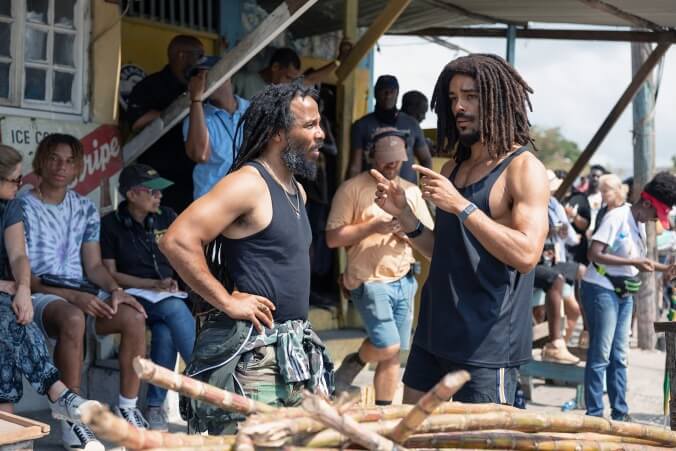Ziggy Marley and Kingsley Ben-Adir shooting Bob Marley: One Love Photo: Paramount Pictures
The idea many of us have of Bob Marley might veer toward caricature. At best, people know about his music and may have some idea of its political subtext; at worst, they may just know his image from dorm room posters. Even Bob Marley: One Love star Kingsley Ben-Adir admits he was in a similar boat. “Before I took on this project, I think I just I had an idea of who Bob was. I knew some of his music,” he told The A.V. Club earlier this month.
One Love, which opened in theaters on Wednesday, attempts to deepen our understanding of Marley, for both fans and for the uninitiated. Set over the course of a couple of years in the late 1970s, the film follows Marley as he plans Smile Jamaica, a concert intended to help unite the Caribbean nation as it stands on the brink of a civil war. Following an attempt on his life, Marley relocates to London, where he records the Exodus album. As Ben-Adir says, “The movie really is an exploration of that, and how out of that trauma came this masterpiece.”
The film hints at some of the hard work Marley put into his music; while he was obviously a gifted songwriter and musician, his music with The Wailers was a craft as much as an art. “It holds a power and it carries a heavy vibration that I now know was very intentional,” the film’s star explained. “Bob dedicated his life to music and he achieved incredible things in his art form. And that was because it was something that he did every day and he put everything all of his spirit into his music.”
One of the challenges for Ben-Adir was learning to grasp Jamaica’s distinct accent. “I would describe Jamaican Patois as more of a language,” he said. That process included the requisite coaches and is a feat on its own, but it was also a key to unlocking part of who Marley was as a man. “Once you uncover everything that he’s saying in his songs and you realize how connected it is to God and spirituality and the injustice that he was seeing around him, particularly as it related to Black people … What it took him to get to that message of peace, love, and unity was a lifelong journey,” Ben-Adir said.
But the language was also part of the film’s quest for authenticity—a quest that included frequent input from Marley’s relatives and friends. “The moment I auditioned, I flew out to meet [Bob Marley’s son] Ziggy,” Ben-Adir recalled. The actor also met with Marley’s friends, and many of those friends and family were there on the first day of filming—which made for an intimidating morning. “They’re all standing behind the monitor. They’re all watching,” Ben-Adir said. But them “being there on set every day turned into like, the biggest blessing, in a way.” It was through their presence that Ben-Adir says he “really found him and his spirit and what he was going through.”
Even if One Love falls into a lot of the same problems as a lot of musical biopics—it’s next to impossible to hit all the salient points without resorting to a whole lot of montage, for example—it still works as a primer for those who may be less familiar with his story. “I feel like I’ve always known who Bob was, or at least some of his music,” Ben-Adir said. “I now look back and realize I didn’t really know anything at all.”





























![Rob Reiner's son booked for murder amid homicide investigation [Updated]](https://img.pastemagazine.com/wp-content/avuploads/2025/12/15131025/MixCollage-15-Dec-2025-01-10-PM-9121.jpg)











